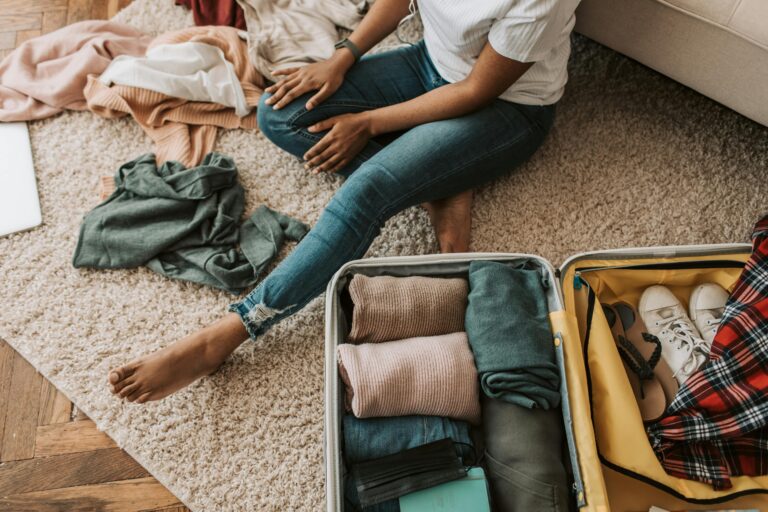The Complete Guide To Moving Out For The First Time
Beyond being a change of physical location, leaving home and moving out for the first time is one of the most defining transitions into adulthood. It marks the point where you begin taking full ownership of your finances, time, space, and responsibilities.
Moving out means more than having your kitchen or not needing to ask permission to have friends over. It means budgeting for rent, cooking your own meals, doing your own laundry, managing your own time, and facing challenges that come without a safety net.
And that’s exactly why this step matters so much: it’s the bridge between dependence and self-reliance.
What This Guide Will Cover
This guide is your go-to manual for making your first move-out a success. We’ll cover:
- How to know if you’re ready, financially, emotionally, and practically
- What it realistically costs to move out (and how to do it with no money)
- Where to live cheaply, safely, and smartly
- How to budget, pack, and prepare without losing your mind
- What to expect emotionally once you’re out on your own
You could have a steady job, some savings, or absolutely nothing, but regardless, this guide is built to meet you where you are.
Yes, It’s Overwhelming—But Totally Doable
Honestly, moving out for the first time is scary. There’s fear, excitement, doubt, and probably a bit of guilt (especially if your parents aren’t on board).
But here’s the truth: millions of people have done this before you with less, and you can too.
No, it won’t be perfect. But with a plan, a little hustle, and a lot of honesty, you can move out and start building the life you want.
Let’s break it down step by step.
Are You Ready to Move Out? (A Quick Readiness Quiz)
Before you pack your bags, take a moment to get brutally honest with yourself. What you are about to do isn’t just about wanting space; it’s about being ready to manage your life solo. Ask yourself these questions:
Emotional Signs
- Do you feel constantly stressed, smothered, or out of sync living at home?
- Are you craving privacy and autonomy, even if it means struggle?
- Do you want to make decisions for your own life without filtering them through your family?
If you’re nodding yes to these, it’s a sign you’re emotionally ready to separate and start defining life on your terms.
Financial Signs
- Do you know exactly how much money you’ll need monthly to survive?
- Do you have a steady income or at least a plan to earn immediately?
- Can you pay rent and basic bills without going into debt?
Even if you’re broke, what matters is that you’re aware of the costs and have a realistic path forward.
👉 How to Move Out With No Money
👉 Budgeting for Your First Apartment
Practical Signs
- Do you know how to cook basic meals and clean a bathroom?
- Can you stay on top of rent, bills, and appointments without reminders?
- Are you ready to troubleshoot problems without calling Mom or Dad first?
Being “ready” doesn’t mean being perfect. It means being resourceful, responsible, and willing to learn quickly.
👉 How to Know You’re Ready to Move Out
How Much Money Do You Need to Move Out?
Money is one of the biggest deal-breakers when it comes to moving out, and rightly so. Let’s break down the basic numbers you need to think about.
First Month’s Rent + Security Deposit
Landlords typically require the first month’s rent plus a security deposit (often equal to one month’s rent). So, if rent is $1000, you may need $2000 upfront.
Some places may also require last month’s rent, so know the policy before you commit.
Monthly Living Expenses
Here’s what you should budget for each month, at a minimum:
| Expense | Estimated Monthly Cost |
| Rent | $1726 (location dependent) |
| Utilities | $156 |
| Groceries | $504 |
| Transportation | $1000 |
| Phone/Wi-Fi | $36 |
| Total | $3422 |
These numbers vary, but they give you a realistic baseline.
👉 Download a Budget Calculator
Basic Moving Costs
- Truck or van rental: $0–$200 (or borrow one)
- Packing supplies: $20–$50
- Furniture: $0–$1500 (Facebook Marketplace, thrift stores, friends)
Want to avoid rookie money mistakes?
Read: Smart Financial Tips for Moving Out of Your Parents’ House — learn how to stretch your budget, cut costs, and build a stable foundation from day one.
Where Should You Move? (Housing Options for First-Timers)
Where you live will directly impact your finances, mental health, and lifestyle. Think strategically—not just emotionally.
Renting a Room vs a Full Apartment
- Room: Cheaper, shared utilities, less privacy
- Studio/Apartment: Full independence, higher cost
- If this is your first move and money is tight, renting a room is a smart launchpad.
Living With Roommates vs Solo
- Roommates split rent, utilities, and chores; this is ideal if you’re just getting started
- Living alone offers more freedom but requires a stronger income buffer
If you’re emotionally stable but financially shaky, roommates are a solid bridge.
Moving Out of Town/State
- Rents can be much lower in smaller cities or rural areas
- Be sure to research job markets, transportation, and support systems
- Avoid romanticizing relocation without income or connections
👉 How to Find a Room to Rent on a Budget
Moving Out For the First Time Checklist: What to Do Before You Go
Before the boxes, before the lease, there’s a list of real-world tasks you need to tackle to protect your finances, your identity, and your sanity. Here’s what to do before you leave home:
Notify Your Parents or Guardians (Yes, Even If It’s Tense)
Unless you’re in an unsafe situation, it’s wise to communicate your decision respectfully and clearly. Be direct about your plan, your timeline, and your reasons. This notification is more about accountability than permission-seeking.
If you’re leaving on bad terms, document everything and consider consulting a legal or social services advisor for protection and guidance.
Gather Your Legal Documents, Forward Your Mail, Update Banking Info
You need to take your identity and logistics with you when you leave. This includes:
- Government-issued ID (driver’s license or state ID)
- Social Security card and/or birth certificate
- Health insurance card and records
- Banking information and logins
- Employment records or offer letters
Set up mail forwarding with USPS so you don’t miss bills or important paperwork. Also, update your billing address on bank accounts, subscriptions, and job paperwork.
Secure a Job or Income Stream Before You Move
If you’re not moving for a job, plan your income in advance. Even gig work like DoorDash, Uber Eats, or warehouse jobs can give you breathing room in your first month.
No job = no stability. Period.
See: How to Move Out With No Money
Save Every Receipt, Track a Timeline
Document your expenses from day one, including first rent, deposits, and moving supplies. Keep digital copies in a cloud folder or Google Drive. Start building financial awareness immediately.
Use a free budgeting app or spreadsheet from day one.
📝 Download the Moving Out Checklist (PDF)
First Apartment Essentials: What You Actually Need
You don’t need Pinterest-perfect décor to survive. Focus on function over form. Here’s what you need and how to get it without going broke.
Kitchen Must-Haves
- 1–2 pots and pans
- Basic utensils (knife, fork, spoon, spatula)
- Plates, bowls, mugs (thrift or dollar store)
- Can opener, dish soap, sponge
- One sharp kitchen knife
Bathroom Basics
- Shower curtain + rings
- Towels and washcloths
- Toilet brush and plunger
- Toothbrush, toothpaste, soap, shampoo
- First-aid kit
Bedroom/Core Living
- Air mattress or mattress pad
- Bedding (sheets, pillows, blanket)
- Lamp or light
- Hangers
- Hamper or laundry bag
Buy, Thrift, or Get for Free?
- Buy new: Items that impact hygiene (mattress pad, towels, utensils)
- Thrift: Furniture, cookware, storage bins
- Free: Online Marketplace, Buy Nothing groups, friends/family hand-me-downs
Planning and Packing: How to Move Smoothly
Whether you’re crossing town or couch surfing to start, smart packing = less stress and fewer surprises.
Pack Like a Minimalist
Only bring what you absolutely need. Prioritize:
- ID and documents
- Work clothes, 1 week of casual outfits
- Toiletries
- Chargers and tech
- Any medications or health-related items
Label boxes clearly by room or category. If you don’t have suitcases, use bags, bins, or even laundry baskets.
Get Help: Friends, Family, or Cheap Labor
Recruit friends to help load and move. Offer pizza or gas money. If you can’t, hire hourly moving help from sites like TaskRabbit, or local college boards.
Moving Truck or No Truck?
- Truck: Best for long distances or large items
- Borrowed vehicle: Great if you’re starting minimal or close by
- Car: If it’s just clothes and basics, you can do it with a sedan
Protect Your Valuables
Pack sensitive items like:
- Passport
- Social Security card
- Laptop/phone
- Medications
…in a backpack or small carry bag that always stays with you.
Setting Up Your New Place
Once you’ve got the keys, it’s time to transform your space from “bare walls“ to “livable space.“
Set Up Utilities, Wi-Fi, and Renters Insurance
- Electric/gas/water: Set these up BEFORE you move in
- Wi-Fi: Choose an affordable plan if you’re working or studying from home
- Renters insurance: $10–$20/month protects your stuff in the event of a fire, theft, etc.
Stock the Fridge
Start with low-cost, high-nutrition basics:
- Rice, pasta, eggs, bread
- Peanut butter, frozen veggies, canned beans
- Salt, pepper, oil, hot sauce
- Coffee or tea (yes, morale counts)
Furniture on a Budget
- Free: Look on Craigslist, Facebook Marketplace, or curb alerts
- Buy: Walmart, IKEA, or Target (lowest-tier)
- Priority: Mattress, chair, small table, lamp, storage bins
Create a Cleaning & Maintenance Routine
- Daily: Dishes, wipe counters, put things away
- Weekly: Floors, laundry, trash, bathroom
- Monthly: Fridge clean-out, deep scrub, replace supplies
Tip: A clean space helps you stay focused and mentally stable.
Adjusting to Independent Life
The first 30 days after moving out will test your resilience more than any job or college exam. Prepare for the mental shift.
Expect Loneliness—and Plan for It
Moving out can be isolating. Create routines that build structure:
- Wake up at the same time daily
- Plan meals and walks
- Reach out to friends intentionally
Motivation & Discipline
Nobody is watching you now, but you still have to show up. Set weekly goals for job search, budgeting, meal prep, and deep cleaning.
Manage Work, Food, Health, and Bills
- Set reminders for rent, utilities, and deadlines
- Meal prep Sundays = save money and eat better
- Stay active, even if it’s a walk around the block
- Don’t ignore medical or mental health issues
Build Habits Slowly
It’s not about doing everything perfectly. Just build momentum:
- One paid bill → financial control
- One homemade meal → independence
- One cleaned room → clarity
Conclusion: You’re More Ready Than You Think
If you’ve made it this far, you already have what it takes. No one moves out knowing everything. You’ll learn fast, mess up sometimes, and grow faster than you ever thought possible. You don’t need to wait until you’re “fully ready.“ You need a plan, a push, and belief in your ability to figure things out as you go.
Take your first step today. Share this guide, start your budget, or browse the checklists—because your life is waiting.
References:
https://www.fns.usda.gov/research/cnpp/usda-food-plans/cost-food-monthly-reports
https://itdp.org/2024/01/24/high-cost-transportation-united-states/monthly-reports
https://www.nerdwallet.com/article/finance/how-much-should-i-spend-on-groceries






